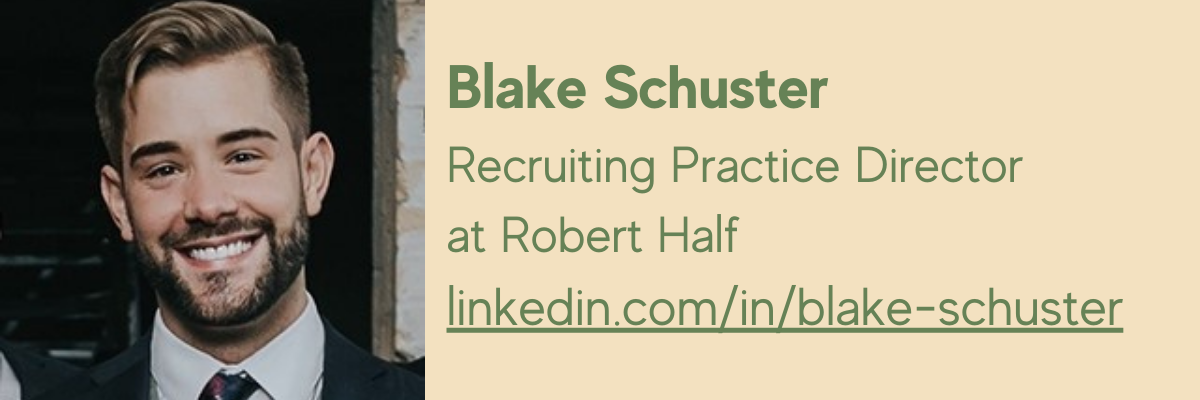Staffing Agencies with Blake Schuster
Making sure you have the right team for a successful business can be difficult. Sometimes that means adding full-time, permanent staff members and sometimes it means adding people with more flexibility. Temporary workers make up about 2.1% of the US workforce, or around 3.1 million people working on any given day (including contract workers). Many of these workers are matched with the help of one of the 25,000 staffing agencies in the US (1).
Blake Schuster, Recruiting Practice Director at Robert Half, has worked at staffing agencies for over 8 years. Blake has helped teams of all sizes make sure they have the people they need to succeed. He took the time to address the how, when, and whys of working with staffing agencies.
What kinds of companies do you work with to help fill roles?
All kinds, we don’t discriminate! We work with startups, fortune 500 organizations, creative and marketing agencies, and everything in between. Any organization can benefit from partnering with a specialized staffing firm and we have more clients than one would expect. That said, we have found that mid-sized organizations tend to use our services the most. Specifically, organizations that do not have the expertise, or capacity to fill specialized marketing/creative positions, but have the budget and business needs utilize us.
When do you recommend a company connect with an agency like Robert Half?
One benefit of partnering with a firm like Robert Half is that we can add value at any point in the hiring process. Whether it be for industry or salary guidance, a pulse on the current market conditions, a 911, or an unexpected need, we can typically help in some way.
Businesses tend to reach out to us to supplement or complement their internal recruiting efforts. That can be proactively or, if the internal methods are not yielding the desired results, more as a line of support.
While we would always prefer a few weeks’ heads up before a placement is needed, we are more than used to the “oh crap, we need someone tomorrow” phone call.
Overall, we are flexible with our clients and can accommodate their desired timing, but always appreciate when clients reach out AFTER they have budget approval for a role.
Why should someone consider hiring a temporary worker vs. a permanent employee?
There are many questions a business can ask to help determine if a contractor or permanent resource is the best match for their needs. These often range from financial to logistical.
Companies hire contractors/consultants/freelancers/temporary workers to assist with special projects that are not a part of their long-term business plan. This can be from a few hours to, in some cases, multiple years. Organizations also look to hire a contractor or temporary worker to come in and “consult” on a specific business problem.
There are plenty of situations where hiring a full-time employee just wouldn't make sense with the current business workflow.
We often see clients hiring a contractor if they do not have full-time employment headcount approval, but the business needs help now.
Another common situation is where a client has more work than the team can handle, but not enough to bring another person on staff. In many cases, hiring a part-time contractor can lessen the load. Whether that be 5, 10, 15, 20+ hours per week, we have seen it all and there are most likely skilled workers out there looking for exactly that hourly work arrangement - you would be surprised!
Another reason organizations may hire a temporary worker is the supply. As the “gig economy” continues to boom, there seems to be a significant increase in candidates who are either looking to move into more freelance-based work or who are looking for a “side hustle” that they can add to their normal full-time workload.
How have you seen staffing work change over the last couple of years?
As many other industries have adapted to the roller coaster that was the last two years, the staffing industry is no exception.
I distinctly remember thinking “what am I going to do!?” back in April of 2020 when demand for our services was at an all-time low and the future was uncertain.
Now, fast forward through 2021 to 2022, and the demand for talent, and our services, have never been higher.
Although many aspects of professional life have changed over the last two years, one constant is that candidates are largely prioritizing positions that offer a 100% remote working arrangement. Everyone is looking for a better work-life balance, and from my experience, it feels as though remote work is here to stay. This change has impacted how staffing agencies source candidates and provide them with remote workstations.
With the boom in the labor market and demand for remote work, companies have been forced to adapt and, consequently, examine their hiring processes.
Companies are offering higher compensation than ever before, the option for 100% remote work, office furniture bonuses, additional paid time off, and other perks!
Comparing the conversations from 2019 to now, it barely feels like the same industry!
In addition to higher salaries and remote work, the way that companies are viewing staffing positions has changed. For example, companies have in some cases reduced the required years of experience for a role, or listed a tool/platform as “nice to have '' where in 2019/2020 it would have been a hard requirement. The result of this is organizations finding value in a candidate's potential to learn a skill, compared to their prior experience.
With the seemingly exponential increase in demand for workers, staffing agencies are forced to change their processes and overall candidate experience as well. The Agency/candidate/client relationship is immensely important and approaching a candidate conversation with the “what is in it for them” is a must. Additionally, staffing agencies are improving their candidate experience by offering better incentives such as healthcare benefits, 401K, and paid time off.
What are the pros and cons of hiring temporary staff?
I may be biased, but it seems like the pros of hiring temporary or contract staff significantly outweigh the cons.
PROS
Hiring temporary staff allows an organization to scale their personnel to align with business goals, which can help companies save money.
In addition to saving money, hiring contractors or temporary staff can also save time.
We often say that it can take an average of 6 weeks to make a full-time hire, but to hire a contractor through an agency like Robert Half, it normally takes a week or two to get someone in the door.
Hiring a contractor can be an effective interim solution to keep projects moving forward while HR looks for a FTE replacement.
The process of hiring contract staff often requires fewer steps/interviews, and stakeholders. No one loves 5 rounds of interviews :)
As mentioned, hiring contract staff can save organizations money by aligning resources to high priority initiatives, and then scaling the resources down when the project is complete and project budgets are utilized. You obviously do not have the same luxury with full-time staff.
Another lesser-known perk from a client perspective is that budget for contract staff can come from a different “bucket” within an organization’s finances, and although a company does not have headcount approval for a full-time role, they could still get the help they need through a contractor.
CONS
On the other hand, skilled temporary or contract staff can be difficult to find, even for us!
Once you secure someone for a temporary assignment, the business always runs the risk of the contractor leaving for another full-time position, or before the project or initiative is complete.
What tools does Robert Half use to find staff/talent?
As a global leader in specialized staffing services, Robert half uses a unique mix of methods, programs, and tools to source, screen, and place talent.
We are continually identifying new ways to improve our sourcing process while considering the candidate experience. Robert Half remains dedicated to investing in technology to stay at the top of the staffing industry!
How has the COVID-19 pandemic affected your business and your clients?
The national shift to remote work has radically shifted the way we source and view the talent market, which comes with its own benefits and challenges. On the positive end - being able to draw from a national, remote, talent pool has, in many cases, made finding a qualified candidate easier and faster! Drawing from a national, remote talent pool has also given clients access to top-tier talent that they may not have had access to pre-pandemic.
This, however, does come with its own set of challenges. Minnesota-based organizations are undoubtedly up against more companies competing for local talent, and in many cases they’re companies with east and west coast “cost of living” compensation packages.
Additionally, navigating and complying with organizations’ unique covid-19 vaccination requirements has been an ongoing challenge.
What led you to work in the staffing field?
As many others in the field may tell you, staffing sort of found me! A close friend called me up out of the blue one day and said, hey, I think you would be good at this. As a new college grad, I thought “hey, what do I have to lose!” 8 years later, looking back, I am so thankful for that phone call.
I double-majored in marketing and human resource management in college, and never thought I would identify a career path that would allow me to pursue both of my academic passions. That said, here I am leading a recruiting team that specializes in staffing marketing and creative positions. I can say I am one of the lucky ones, working in a field that aligns with my degree.
Although I fell into the staffing by chance, it is the positive impact I have on candidates that keeps me here. Also, being the resource “behind the scenes,” identifying key personnel that directly impacts organizations’ success, is exhilarating and honestly pretty fun. I’d say that staffing is just as rewarding as it is challenging.
What role does social media play in your business?
Like any other industry in our social media-dominated world, staffing is no different. A strategic social media presence is key from brand awareness and brand building perspective. Additionally, social media is a powerful tool for posting positions and, of course, networking with applicants (answer the inmails, I swear it is worth it).
What should companies and/or job seekers be aware of when using social media? What are some mistakes you’ve seen?
Before I entered the staffing world, I used to think, why would an organization ever look at my social media, why would they care, they wouldn't look at my Facebook page, would they?
Boy was I wrong.
I could dig into a variety of examples, however, as a general tip, I’d recommend approaching your social media from the lens of a hiring manager or potential employer. Ask yourself, “how will my content reflect on the company I work for, or would like to work for?” A fairly obvious no-no is speaking negatively about your current or past employer on social media. I’d generally recommend keeping profiles private, or at the very least doing a quick audit every now and then to make sure your content is generating the message you want it to.
The same goes for companies! With the tight labor market, companies need to take every step they can to appeal to a potential job seeker. It would surprise you how quickly a job seeker can be turned off by a company’s social presence.
What is the hardest part of your job?
How much time do we have? Only kidding.
I’d say the hardest part of my job is that my job is never really “done” and, although that is the “hardest” part, it is also a big reason behind why I love what I do.
There is simply always another task to accomplish, another call to make, a candidate or client to check in with, an industry article to read, etc. The days seem to fly by and I can honestly say I am never “bored” or disengaged in my role.
Another difficult part is that we are in the business of people, and as you know, people can be… well, unpredictable at times. No matter how thoroughly you vet someone, or how confidentially you feel about a situation or client/candidate fit, I am always surprised.
How rigorous is your matchmaking process?
Our vetting and matchmaking process is the backbone of our business, reputation, and directly impacts our short and long-term success. That said, we take it pretty seriously! We try to meet every client and engage in a conversation around a position’s key success factors, goals, and the intangibles that will make someone successful in the role/organization.
We also try to meet every candidate we represent, to assess how they would align with the position not just on paper, but with the overall cultural/environmental fit and how this position aligns with what THEY want. I know there are no “perfect” candidates, but we strive to get as close as we can.
How do you see the staffing field changing in the future?
I sure wish I had a crystal ball. With the competitiveness of the current labor market, and the “war on specialized talent” not ending anytime soon, I’d expect companies to have to streamline and expedite their hiring process to meet their hiring goals. That said, I would expect automation and artificial intelligence to play a larger role in the sourcing and match-making process.






